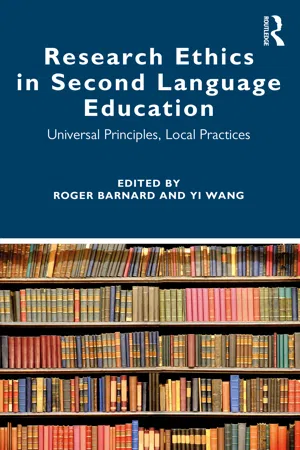
Research Ethics in Second Language Education
Universal Principles, Local Practices
- 176 pages
- English
- ePUB (mobile friendly)
- Available on iOS & Android
Research Ethics in Second Language Education
Universal Principles, Local Practices
About this book
This book makes a fresh contribution to the field of research ethics by considering research issues through relatable autobiographical narratives. The book's core offers narratives by novice second language education researchers who are completing PhD degrees using data from international research participants. These narratives expose challenges regarding the ethical identity of researchers working across diverse value and belief systems. The narrative chapters are followed by four chapters of commentaries from a line-up of international scholars with various academic, linguistic, and cultural backgrounds.
The case study approach reports the experiences and reflections of research students before, during, and after the data collection phase of their projects, and offers insights into the recruitment of participants; acquiring and maintaining access; interpretations of the notion of informed consent; incentivising participants; the implications of ensuring anonymity and confidentiality; the right to withdraw participation and data; the positioning of the researcher as insider or outsider; potential conflicts of interest; the potential harm to participants and researcher; and the dissemination of findings.
This practical and relatable book is aimed at research students and their supervisors in fields such as applied linguistics and education, as well as those following methods courses, to help illustrate the ethical challenges faced by researchers in the process of collecting qualitative data.
Tools to learn more effectively

Saving Books

Keyword Search

Annotating Text

Listen to it instead
Information
1
ORAL CORRECTIVE FEEDBACK
Ethical issues in researching Vietnamese lecturers’ beliefs and practices
Introduction
Reflection for action
Gaining access: Gatekeepers
When I return to Vietnam, I will make personal contact with the Dean of the Faculty where my research is to take place. I will mention the purposes and activities of my study and ask for his permission and support as well as his signature on the information letter. Once the Dean’s approval has been gained, I will ask for his signature on the information letter. Finally, I will meet the Rector with the signed letter from the Dean and the Head and ask for his approval and signature in the information letter.(21/12/15)
Recruiting participants and informed consent
I will meet lecturers in a faculty staff meeting or via personally arranged appointments to talk about my research intent and invite them to participate in the project. Potential lecturer participants will have opportunities to ask any further questions about their involvement in the research. The expected number is six to ten full-time lecturers teaching second-year students. If the number of lecturers is lower than my expectation, I will recruit from two other faculties.(22/01/15)
Each participant will need to inform students about the presence of the researcher in the class; however, it is not necessary to gain their formal consent as, in Vietnam, teachers are traditionally regarded as in loco parentis. If students are aware that their teachers have allowed the researcher to become the observer of the class, they will take it for granted.(22/01/15)
My role as insider
Table of contents
- Cover
- Half Title
- Endorsement Page
- Title Page
- Copyright Page
- Table of Contents
- Notes on the Editors and Contributors
- Abbreviations
- Introduction
- Prologue
- Chapter 1: Oral Corrective Feedback
- Chapter 2: Academic-Related Brokering Practices Among International Students
- Chapter 3: Ethical Challenges in Conducting an Action Research Project
- Chapter 4: Ethical Issues in Researching Peer Observation of Language Lecturers in a University in Pakistan
- Chapter 5: Language, Identity, Culture, and Ethics
- Chapter 6: Research Ethics From a Malay–Muslim Perspective
- Chapter 7: Research Ethics From the Viewpoint of a Japanese Qualitative Researcher
- Chapter 8: Engaging with Ethical Research Practices in China
- Chapter 9: Justice and Educational Research
- Afterword
- Index
Frequently asked questions
- Essential is ideal for learners and professionals who enjoy exploring a wide range of subjects. Access the Essential Library with 800,000+ trusted titles and best-sellers across business, personal growth, and the humanities. Includes unlimited reading time and Standard Read Aloud voice.
- Complete: Perfect for advanced learners and researchers needing full, unrestricted access. Unlock 1.4M+ books across hundreds of subjects, including academic and specialized titles. The Complete Plan also includes advanced features like Premium Read Aloud and Research Assistant.
Please note we cannot support devices running on iOS 13 and Android 7 or earlier. Learn more about using the app